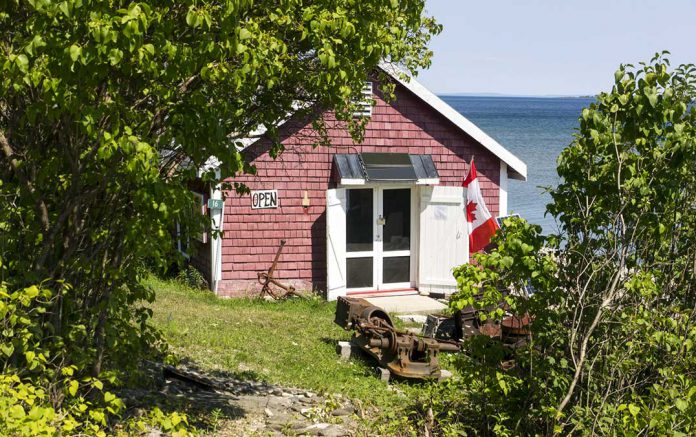Lyle and Ann are both dyed-in-the wool Islanders, living in an idyllic part of Western Manitoulin. “I am the fourth generation to live on Lot 25, Concession 9 on the shores of Silver Lake since April 23, 1889. Our son and daughter own parts of the original 200 acres and they make the fifth generation. We love it here. The scenery always changes and it’s never boring. We see lots of birds and deer and other wildlife. Recently, our neighbour even spotted a lynx,” he proudly states.
Norman Lyle was born on May 19, 1943 to Jack and Dorothy (Nee Hopkins) Addison. He was named after a maternal uncle. Great grandfather George Addison lost two of his six sons to drowning; William, from a fishing tug in Burnt Island and Edward, when the ‘Jones’ sank. William, 16, tied to the mast, disappeared when the boat turned over. He may be the ‘unknown’ sailor later found on Deadman’s Point. Edward had been tied into a fishing crate and was later identified by his brother.
Lyle has three older siblings John Joseph (Jack Jr.), Ronald Edgar and Lorna May. “Dad was known as a ballplayer in Gore Bay and Silver Water. I went to games with him to watch him catch. In 1950, his Gore Bay team won against Murray McDermid’s highly ranked team. At home, we practiced pitching the ball against the wall of our shed, eventually knocking off all the shingles on one side.” This love for fastball was rekindled in Lyle, starting in 1959 and continuing for 43 years. His team played teams like Gore Bay, Sudbury and Espanola. “We won our share of trophies.”
“My musical mum stayed at home, quilting, and playing the piano or accordion, often joined by a family member who played guitar. Mum also tended to the cows, sheep and turkeys. We were making one dollar per bird and that was a better return for 3,000 turkeys than we would have made from selling milk or sheep.”

The whole family got the birds ready for market. “An assembly line had us doing various roles, with the youngest plucking out the pin feathers. The ‘New York-dressed’ turkeys with the insides intact were chilled so the bird could be blessed by a rabbi in New York. Eventually an eviscerating plant was set up in Gore Bay, but ultimately the feed companies, with a monopoly on the feed production, got control and our turkey quotas were bought out in the south.”
1948 yielded a near-death experience. “I remember drifting out on our 30 ft. dock with my older sister who knew I was compelled to jump in the water. The third plunge was over my head. I remember lying on the bottom of the lake and feeling very peaceful. Images of my favourite toys flashed before me. I saw my cowboy belt and two red-handled cap guns, Christmas gifts from my older brother Jack, who worked on the freighters. Suddenly, I felt a hand grab my hair and I was quickly propelled to the surface. The water was pushed from my lungs and I was breathing. No one knew about this for a long time.”
“In the winter of 1950, it was expected that I would walk the five kilometers to SS#1 Robinson for Grade 1 through the deep snow. My older brother walked ahead, my sister followed, and I jumped into their footprints. About 50 kids and two teachers shared one room. Today there are only two school-age kids in this township. Teacher Sheila Slomke, 18, was nice. This was her first job, but she inspired me to follow her career. Today, if we run into her, in town, she wants me to recite something she had on the blackboard that first winter.”
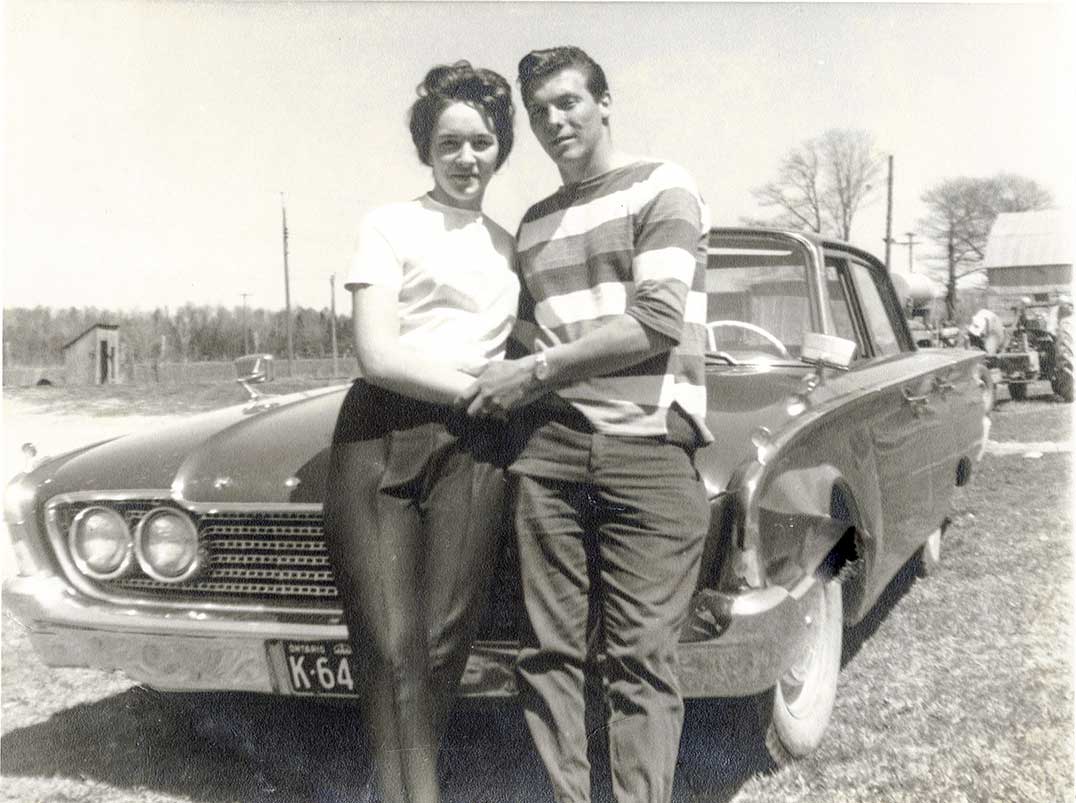
“Games we played included ‘Anti-I-Over the School,’ ‘Ducky-on-the-Rock,’ ‘Softball,’ ‘Scrub’ and ‘Red Rover, Red Rover.’ Inside the school, it was ‘Button, Button, who’s got the button?’ Outside, we also devised a game called, ‘Horse’. Being smaller at that age, I was the rider and Murray Duncanson, the horse. The riders could do almost anything, grab or do head-locks to get the rider off the other horse. Murray knew when to stay and fight, and when to run. The last team standing got a nickel from all the other teams. Come to think of it, I think Murray owes me a few of those.”
No television signal until 1960 meant mischief was on the agenda. “One Hallowe’en, our minister found his buggy on top of the school roof. He was very surprised that the buggy was in good shape after being dragged about a mile and lifted on the roof. Nevertheless, the OPP warned the perpetrators, ‘no more shenanigans’ or butts would be kicked, and charges made.”
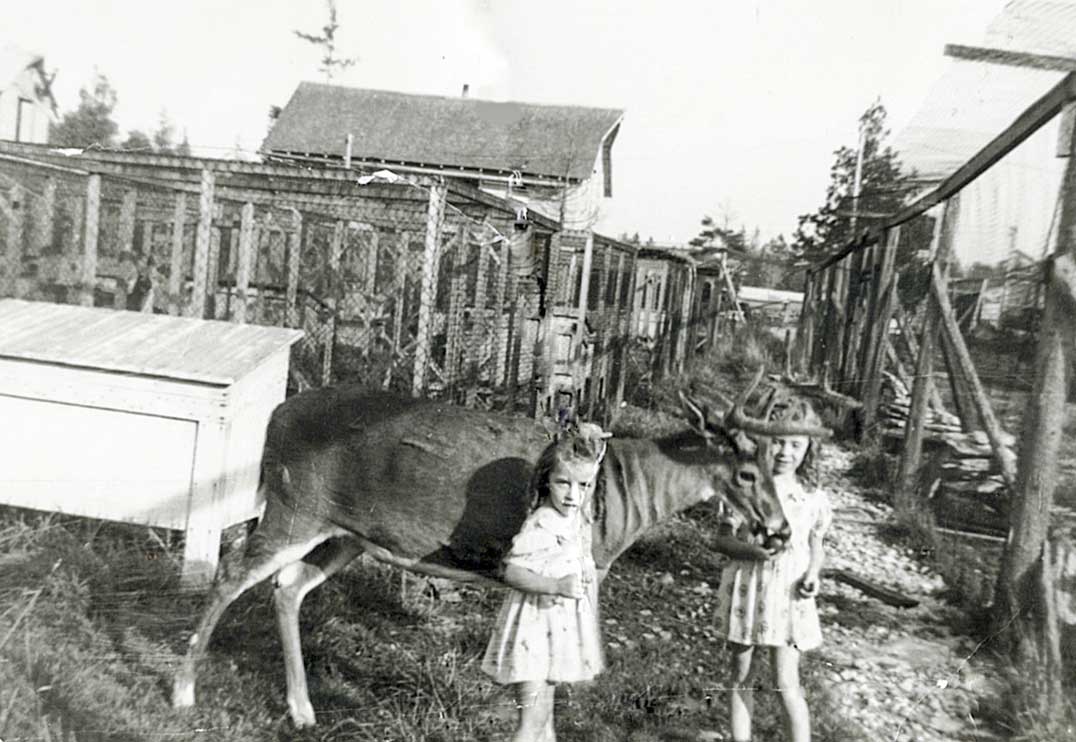
“Leland Trick was banned from our car once because he hadn’t watched where he had stepped after he and some friends overturned Wes Hazzard’s outhouse.” Lyle also recalls repairing the school toilet after another student had dragged it up the highway behind a station-wagon. Nevertheless, going to the outhouse was fun, thanks to Leland Trick and later, his brother Max. Their family store was the source of packages of Du Maurier cigarettes hidden there. We could smoke ‘at our leisure’ and then chew on a breath freshener before going back to the class.”
“Putting wood into the basement for the furnace could be naughty but fun. Standing in just the right spot, you could discern the colour of the teacher’s undergarments as she stood over the grate. We would take bets during the day and establish the winner later when the next volunteer brought the wood in at the end of the day.”
Lyle met his future wife, Ann McKay when her family moved from Burnt Island to Silver Water in 1952. By 1958, they were ‘going steady’. Summer work was available from the Ontario Paper Company, which paid to process pulpwood collected on the beaches. They also needed help feeding the men. “I was a potato peeler on a landing barge equipped with cooks, a portable kitchen, tables and chairs. Up to 80 men could eat a big bag of potatoes each meal. Pies, baked all day, were a treat. Some men would eat a whole pie. The barge moved from bay to bay as needed.”
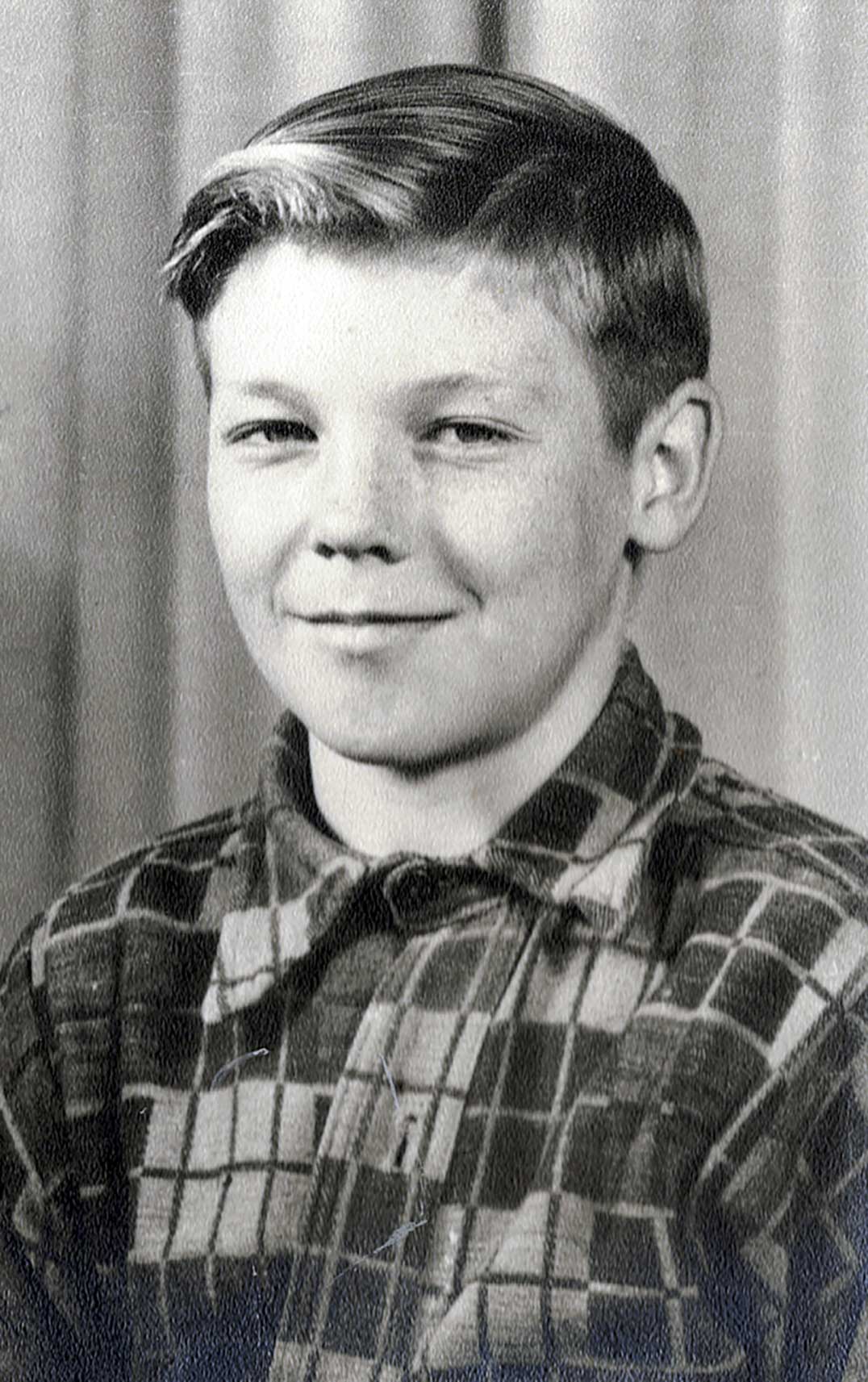
“The logs were hauled to the beach using horses and sleighs, then stripped of bark at four dollars a chord (eight x four x four ft.). A cant hook, that leverages the wood forward, helped move the logs. When the big boat arrived, logs were pushed into the bay in big ‘booms’ assisted by a ‘pickeroon’, an axe-like tool with a sharp point. Men in a ‘Hichie’, a steel boat with strong sides, helped move the boom using 10 ft. pike poles to the waiting ship, headed for Thorold, neat St. Catharines.” Lyle spent three years on the trucking crew hauling cords in specially designed ‘pallet’ trucks that allowed the wood to be piled higher on the truck and hauled to the shore. After 1966, the wood was trucked to Espanola to the E.B. Eddy Mill there.
The courtship between Ann and Lyle continued through High School and Teachers’ College until they were wed on July 30, 1965 in the Silver Water United Church, just after Lyle graduated. Father of the bride, Dannie McKay hosted a turkey and ham meal for 200 guests, with lots of salads and dessert in the Silver Water Hall. The Honeymoon took them to Niagara Falls, Ohio and Michigan, including a trip on the Meldrum Bay Owen Sound Transportation Company ferry from Blind River.
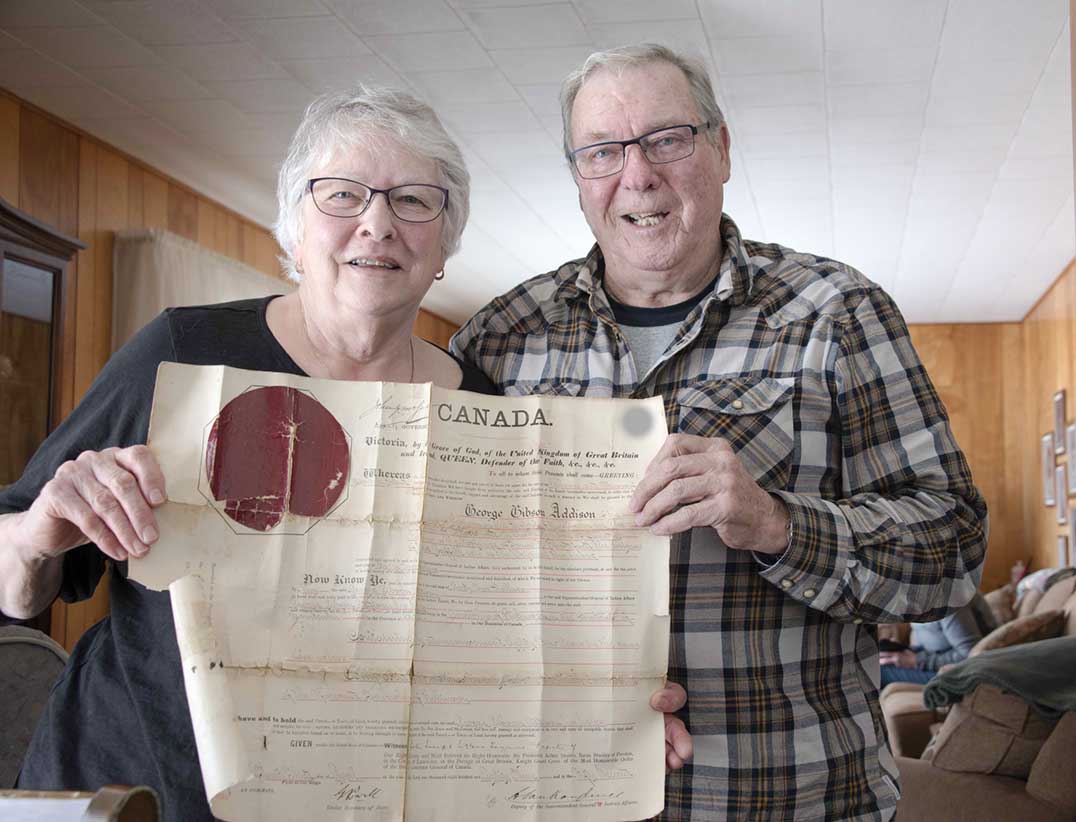
Ann’s paternal grandfather, Angus McKay, of Scottish heritage, was born in Goderich in 1884. He moved to Kincardine, Cockburn Island and later Gordon Township. He married Isabelle Witty and they had six children, one of whom was Dannie, Ann’s dad. When Dannie was six, his mother died in childbirth. He was 13 when his dad passed away.
Ann was born on February 21, 1946, to Donald “Dannie” and Audrey (nee Bailey) McKay. She was named after her grandmother Witty. Ann had an older sister, Joyce, and a younger brother, Cliff. Dad worked for Purvis’ Clover Hill Dairy, just outside of Gore Bay, delivering milk. After the family moved to the western Manitoulin, Dannie timbered for Charlie Wright. He would take the sleigh to Burnt Island Bay and then walk across the ice. After his marriage to Audrey in 1943, until 1987, he managed the mink and fox ranch for the Purvis family. Fish that couldn’t be sold would be fed to the animals.
Maternal Grandfather George Bailey, fisherman and timberjack, was born in 1902, and lived in Evansville, Burnt Island and Meldrum Bay. He and his wife Gertie had four children, one of whom was Audrey, Ann’s mum. Audrey worked for the Gore Bay dentist, Dr. Hinds, as a housekeeper before her marriage. She died at age 33 of a brain aneurism. Dannie was left to raise three children, including Ann, 12 who became ‘mother; to her younger brother. “We did a lot of the housework, made lunches and beds with the help of Grandmother Bailey and Noreen Croft.”
“I used to go with dad to the Purvis Farm to help feed and clean the minks and foxes. Occasionally, we let one run loose in the enclosed area. You had to catch them with a net and put them back into their little boxes. We had to avoid touching the cages, to avoid bites. Once, when I wasn’t paying attention, I got bit on my backside. We earned five cents each Saturday when we came to water all the foxes and minks.”
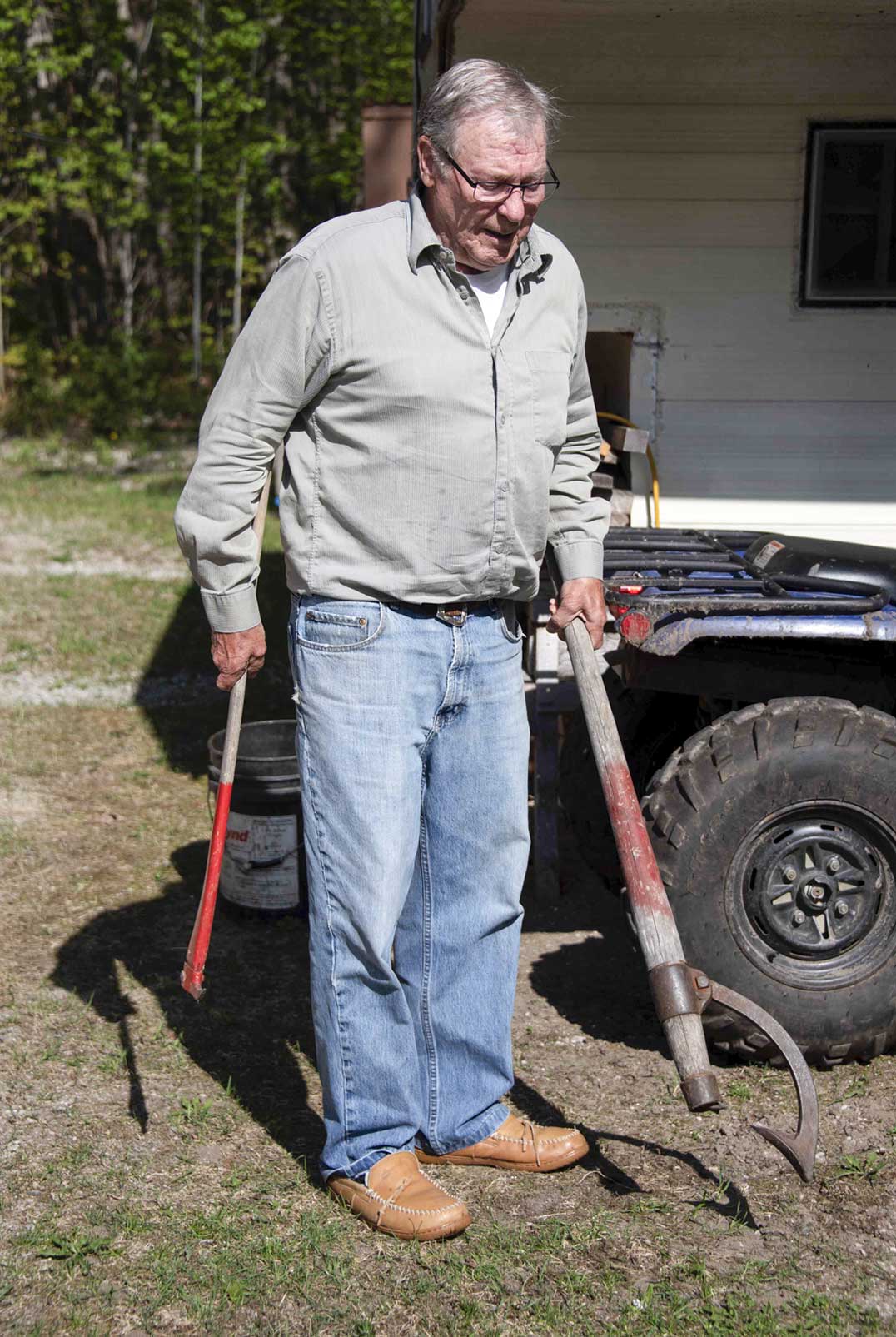
“I saved all my nickels until I could buy a watch for $7.95 from the Sear’s Catalogue. Saturday was also the day our family went to Gore Bay for socializing, for groceries and treats like bubble gum.” After classes ended at the Robinson School in Silver Water, Ann and her sister would rush to Burnt Island. “Dad would meet us on the way and he would let the one who got the furthest, drive the car home, with his help.” As a senior student, Ann worked at the Central Store which sold clothing and groceries in Gore Bay. (This is now the location of Central Pharmacy.)
“Biddy was the name we gave to a young buck whose mother had been shot. He grew up to be a big buck and was our pet for many years. My sister and I helped care for him and his photo was even published in the Toronto Star. It all came to an end when he started to be more aggressive with some people. Unfortunately, we had to put him down, and that was a hard.”
“When Lyle and I married, I remember dad saying, ‘I bought a new car, built a new house and managed to get two daughters married in the same year and survived’.” Lyle was offered the teaching position in Meldrum Bay for $3,450 a year, only $50 less than he would have made in Sudbury; as an added bonus to teaching in Meldrum Bay, Ed Townsend had passed into Grade 9!
Lyle knew he could live more cheaply on Manitoulin. The newlyweds lived with her parents in Silver Water the first year, to help the McKays build their new home. Later the young couple moved into Meldrum Bay and rented a house by the store for $15 a month. Ann started what would be 24 years of housekeeping for Doug and Phyllis Smith in Gore Bay. She also drove the school bus, eventually buying her own bus. When the schoolboards amalgamated, Ann lost her run to AJ Bus Lines who won the contracts for nearly all of Manitoulin.
Meanwhile, Lyle was teaching 20 great’ kids from Kindergarten to Grade 8. “I remember the day the new school inspector came. One of the boys had injured himself before classes. I took him to his grandmother, and she took him to the hospital. A strange car sat at the school gate upon my return. The inspector was at the front of the class trying to teach the kids math. The kids had told him where I was, and he was trying to help; but admitted he was lost. In hindsight, I think it would have been hard for him to evaluate teaching strategy with eight grades in one room.”
“I can still see the last day of classes in1966. It was right after the picnic. One of two boys who had been in a previous altercation was caught standing beside a line of firecrackers, set off behind the community hall. I took the young lad back to the school, scolding him all the way and gave him the strap. He took it well and said nothing for 10 years. One day he visited, all 260 lbs, six-foot-five of him. ‘Mr. Addison, I want to set the record straight. I didn’t light those firecrackers. I was just checking out what was happening, like you were.’ The young man had forgiven his teacher, but his teacher had a hard time forgiving himself.
When all the school boards were amalgamated in 1969, Lyle was transferred to Charles C. McLean Public School in Gore Bay to teach Grade 7 and 8. He was one of only three male elementary school teachers on Manitoulin at that time. This was a big change for Lyle. He became vice principal and taught 38 children (28 boys and 10 girls) compared to 20 before. The boys used up most of his energy. “I was away for one day, and upon my return I found a lengthy list of misdemeanours sitting on my desk. The worst offence was the suspension of the minister’s son high up on the backstop of the baseball field. He had been standing on someone’s shoulders when both his hands and feet were tied to the screen, so he couldn’t come back after lunch.”
Pranks were more common in the pre-electronic age. It was not unusual for one farmer’s cows to be exchanged with another farmer’s animals. “Golden Noble must have been surprised when he tried to milk his cows one morning.” However, Lyle was saved from having to deal with many subsequent pranks by Big Dave, one of the students, whom he had taken into his confidence. “I asked him to help me with the boys. Much of the shenanigans ended after that.”
“Years later, I asked him why he helped me. He said, ‘I was afraid that you were at the ‘end of your rope’ and would soon replace Friday afternoon baseball with math or English. Besides, I probably deserved it for something I had done you didn’t know about.’” Lyle spent 30 relatively peaceful years of teaching Grade 8 math and geography after that. “In hindsight, we were blessed to have such great students.”
The couple soon moved back to Silver Water to be closer to Gore Bay. In January 1967, a son, Lindsay, was born. Ann stayed home. Daughter Lori was born two years later. At the time, Lyle was away playing baseball and was deemed ball crazy by his wife because he devoted so much time to his favourite sport. Lyle concedes, “I had watched and admired players like Ken McKenzie, Murray McDermid, Grant Priddle and Bud Thorburn, my childhood idols, all pitchers. One fellow, Bruce Irving’s son, could pitch with either hand and he wound up playing in the pros.”
Lyle retired in 1998. He worked on the Recreation and Planning Boards and continues as chair of the Roads Board. Daughter Lori married John Mastelko who is the meat manager at GG’s Foodland in Little Current. Lori is the administrative assistant to the CEO of the Manitoulin Health Centre. Lori and John have two sons. Older son Bryce is studying Forensic Science at Laurentian and Brett is in Grade 8. He hopes to beat his grandfather at table tennis one day.
Lyle and Ann’s son Lindsay studied mechanics at Sault College and he runs BJ’s and Addison’s OK Tire in M’Chigeeng with his wife Lisa Corbiere, who also teaches at the high school. The couple has four children: Brendan, Brittanny, Breanne and Brooke. Brendan owns Addison Mobile Mechanic. He has a son, Emmett, who is Lyle and Ann’s first great-grandson, who might become the seventh generation to live on the family land. Daughter Brittany goes to school in Sarnia. Breanne works at Manitoulin Transport and Brooke is finishing high school.
“Although we have been married for 53 years it is our 60th year together, if we count the years we were going steady. When we are asked how many years we have been together, the answer by Ann depends upon how she feels about me at the time. If she is happy with me, they hear 60 years.”
Ann shares, “I have always collected dishes and they decorate much of our space. Many of these came from places we visited. We have seen every province in Canada, except Newfoundland. We especially loved our Alaskan cruise and visiting the west coast.”
“Favourite television shows? We like Discovery Channel and Forensic Files.”
Lyle says baseball and carpentry work have been his favourite pastimes. Ann adds, “I like to knit and work on my flowers in the spring. Recipe for happiness? Find a partner who enjoys the same things and find work you love, then you have it made!”
“I am still hopeful that former students will contact me or say hello if they see me. That would be special. Even our grandson’s dog loves the freedom of living on Manitoulin. He was not happy in the city.” Manitoulin’s ‘quiet’ is much more important than regular visits to the bars or the theatre in the city. Plus most of the people who are important to us live here, including our children and grandchildren. People wave, and guests wonder why we wave back. We know, this is not seen much in a city.”
“I haven’t seen anyplace I would rather live than here on Silver Lake, near Silver Water. Each season comes with something special, like fishing or ski-dooing. There is no need to go to Florida. Lots of people come for two weeks but we live in this great place all year around. It can’t get any better than that.”

